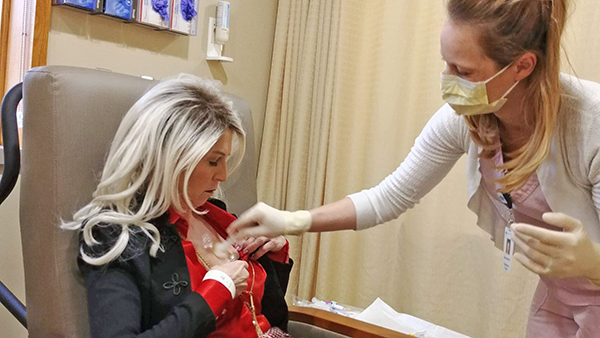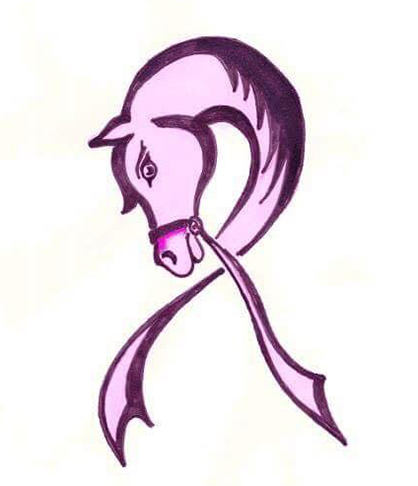Conquering Cancer, One Stride at a Time
Last October, while competing at the Color Breed Congress, Tina Langness received a surprising call from her doctor. After her yearly mammogram, which she’d just had in February, she found a lump in her breast. Being a registered nurse, she wasn’t about to take any chances, so she went in for a second mammogram and scheduled an ultrasound and a biopsy. The results were positive.
“The type of cancer I have is ER/PR positive and Her2 positive, stage 3,” she says. “In November, I had surgery to place a Port-A-Cath in my body to receive chemotherapy, lab draws, etc. I started chemotherapy in December.”
Tina’s first four doses of chemotherapy were given every other week, so her body was given a bit of time to recover from the side effects. “That was probably the hardest dose on me. It’s called the Red Devil, because it’s red in color (Adriamycin). The day after chemo, I was required to go back for a injection called Neulasta. Neulasta pulls red blood cells from your bone marrow to help power up your immune system while receiving chemotherapy.”
“I think most people are familiar with chemotherapy and some of its side effects. The most important one is it kills cancer cells. The biggest bummer is it kills all cells, good or bad, so your body goes into a state of immunodepression – meaning your white blood cell count is affected, so you have less fighting power to protect you against viruses. It also affects your platelets (clotting factors), red blood cell production, etc. It can also cause long-term heart and liver damage. To assure my heart isn’t being damaged, I have echocardiograms every three months.”
Lately, Tina has been undergoing weekly chemotherapy, which has given her body less time to recuperate and fire back. “The chemo is cumulative; so, with each dose, it ‘builds,’ working to kill cancer cells. Once I have completed the weekly doses of chemo, in late May, I will then continue with chemo for another year, but every three weeks instead of weekly. Later in May, I will have another breast MRI and meet with the surgeon to determine what type of surgery I will have. It will be one of three options – a double mastectomy, a single mastectomy, or a lumpectomy. I will also receive 15 doses of daily radiation once I’m healed from the surgery.”
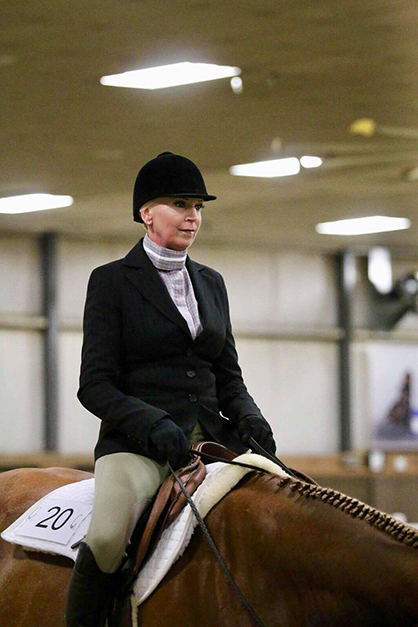
Tina at the Iowa Paint Horse Club’s Spring Fling two weeks ago. Photo courtesy of Beth Foster Hattan.
Despite the weekly chemotherapy doses, upcoming radiation, and pending surgical decisions, Tina remains overwhelming optimistic. She still rides and trains horses every day and even competed at the recent Iowa Paint Horse Club’s Spring Fling in Cedar Rapids.
“It’s not recommended, but I do it anyway,” she says. “I have good help and try to ride three to four days a week. People ask me how I do it, and I’m not sure. I’ve been out at the barn on some of my hardest days, but I need to be out there. The horses give me a strength I cannot get while sitting on the couch. There are days when I have no energy. I can hardly run a brush over a horse. I’m nauseated. My body is in pain, and I can’t think clearly, but I can still manage to crawl up on a horse and ride. It makes no sense, but it I know it’s healing me. The horses also know I’m not 100%, and, for the most part, they take good care of me.”
However, horses are animals and, therefore, unpredictable by nature. A few weeks ago, at Tina’s first horse show since the diagnosis, she was riding a two-year-old in the show pen early one morning. The filly spooked and went bucking across the arena. “My hat and wig went flying,” she says. “I stayed on and two people tried to give me a hand. My friend was trying to hand me the wig, but the filly reacted and took off bucking a second time. Once I was in control, I stepped down off the horse, embarrassingly put my wig back on, and walked to my stalls.”
“I shed a lot of tears that morning. I was so embarrassed and felt a bit defeated for even trying to go to a show so early in my treatment. But then, a little while later, a man who had tried to help me with the filly stopped by my stalls. He said his wife was a 13-year breast cancer survivor, and he wanted me to know that. He also said he was glad I was there. That was that – I will never feel like that again.”
One of the hardest parts of chemotherapy treatment is dealing with the gruesome side effects. For some, it can be completely debilitating. “I do have days like that,” Tina admits. “I have days when I will sleep for 10 hours, get up for an hour, and go back to bed for another four hours. There are days I can’t eat and food tastes terrible. I have mouth sores and a bloody nose. I’m losing my fingernails and toenails. Of course, there is hair loss. That was a tough one. Nothing is normal when you’re on chemotherapy. You’re dealing with one side effect after another, but it’s all relative if the outcome is positive.”
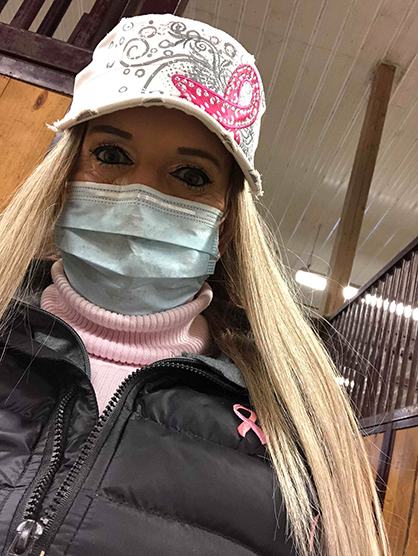 On top of it all, Tina is trying to maintain some sense of normalcy by continuing to ride and compete. But, it hasn’t been easy. A typical horse show weekend can exhaust a normal, healthy person, let alone someone undergoing chemotherapy. “I’m so sick when I leave that I’m cursing myself for every mile I drive. But, when I get there, and I’m around my horse show family, I’m so lifted up and know I’m healing. I did actually show last weekend, and it felt so good just to get through it. It may not have been my best ride, but it was one of the most important rides I’ve had in a long time.”
On top of it all, Tina is trying to maintain some sense of normalcy by continuing to ride and compete. But, it hasn’t been easy. A typical horse show weekend can exhaust a normal, healthy person, let alone someone undergoing chemotherapy. “I’m so sick when I leave that I’m cursing myself for every mile I drive. But, when I get there, and I’m around my horse show family, I’m so lifted up and know I’m healing. I did actually show last weekend, and it felt so good just to get through it. It may not have been my best ride, but it was one of the most important rides I’ve had in a long time.”
Throughout this entire journey, Tina has been very transparent on social media, using the platform to document the treatment wins as well as the more uncomfortable moments. “My reason for the transparency is quite simple. There is too much cancer, and too many people are dying from cancer. My mother died at age 66 from bladder, liver, and lung cancer. Five days after being diagnosed with cancer, she was dead. She had just visited me in Wisconsin and her family in North Dakota in August 2014. In September, she was gone. There was not one sign or symptom up until a few days before she died. Had she been screening, her cancer could have been caught in its earliest stages, and she would probably still be here today.”
“Documenting my journey on social media has been a positive experience, and the entire goal is to make women and men more aware about breast cancer, but also health screening in general. You cannot take a single day for granted. I learned that with my mom and also my stepmom, who is a 12-year double lung transplant survivor. Each time I hear from someone telling me they were screened, it makes me very happy. It means the message is getting out there, and people are reading and listening! There are hundreds of women who have done their mammograms, are on a monthly self-breast exam regimen, have talked to their daughters, their sons, and have considered genetic testing. That’s all I can ask for. If it helps one person, then I’m happy and grateful.”
Tina has chosen to be very public about her cancer and her appearance. Most people know she has shaved her head due to the hair loss from chemotherapy. But, despite her strength and courage, it doesn’t make the difficult days any easier. “It takes a lot for me to be in public. To be honest, it’s been scary for me, because you never know how people are going to react to you. I hate having my head exposed. It’s cold and uncomfortable.”
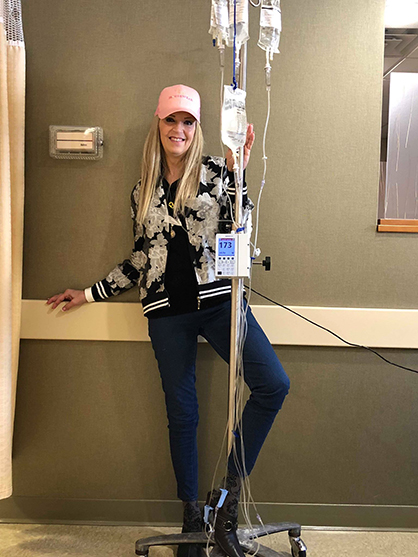 “For some, receiving a cancer diagnosis is a very private matter; but, if people can learn a few things from others who are willing to share, then that’s wonderful. Making this public also helped in ways I never imagined. The hearts and kindness of others never ceases to amaze me. Once people are diagnosed with cancer, they often start to fall off the radar. People move on, thinking that once someone is done with chemo everything will be fine. I feel terrible for these people. The longer you’re on chemo, the harder it is, and that’s when you need people the most. Its easy to curl up in a ball and forget about it all, and I mean everything. The weeks can be grueling, painful, and you’re sick all of the time. Social media has been a good thing for me, as everyone seriously lifts me up. If I’m having a bad day, I can read a few posts and soon will be smiling. There are so many people who have been through cancer and survived. I love their stories the most, but the daily prayers and affirmations keep me going just as much.”
“For some, receiving a cancer diagnosis is a very private matter; but, if people can learn a few things from others who are willing to share, then that’s wonderful. Making this public also helped in ways I never imagined. The hearts and kindness of others never ceases to amaze me. Once people are diagnosed with cancer, they often start to fall off the radar. People move on, thinking that once someone is done with chemo everything will be fine. I feel terrible for these people. The longer you’re on chemo, the harder it is, and that’s when you need people the most. Its easy to curl up in a ball and forget about it all, and I mean everything. The weeks can be grueling, painful, and you’re sick all of the time. Social media has been a good thing for me, as everyone seriously lifts me up. If I’m having a bad day, I can read a few posts and soon will be smiling. There are so many people who have been through cancer and survived. I love their stories the most, but the daily prayers and affirmations keep me going just as much.”
Tina was dealt another blow just two days after her initial diagnosis, when she learned that her father had been diagnoses with colon cancer. “It was all so surreal at the time; but, to make light of a bad situation, I now had someone going through chemo, surgery, and radiation with me. I had a sounding board, and my father knew exactly how I felt.”
“My strength literally comes from the people who support me, as well as an internal mechanism I can’t explain. When given a challenge, I give it my all, and cancer is no different. I try to see the glass half full, like positive affirmation, and enjoy making other people feel good. It’s all reciprocal, but in a positive sort of way. I’ve experienced so many acts of kindness – cards, calls, letters, gifts, hugs, prayers, benefit auction, Go Fund Me page, etc. I cannot thank people enough for all of the support they have given me. It will be my life’s mission to give back in anyway I can.”
Looking forward towards the conclusion of chemotherapy, radiation, and surgery, Tina is hoping for the best outcome- to be cancer free. However, with her background as a registered nurse, she’s well aware that once a person is diagnosed with cancer, there is always the chance for recurrence. “My treatments have pretty much gone according to plan. I’ve handled most of the side effects head on – meaning I am determined NOT to let them get the best of me. Cancer is extremely HARD, depressing, and can wipe you out, physically and mentally. The side effects are terrible; but, if the outcome is to be cancer free, then I’m going to embrace them.”
Tina is committed to helping others who have been through or are currently experiencing a similar cancer diagnosis. She recommends the following websites for more information.
www.thegraciefoundationinc.org
We send our thoughts and prayers to Tina as she continues this battle.










